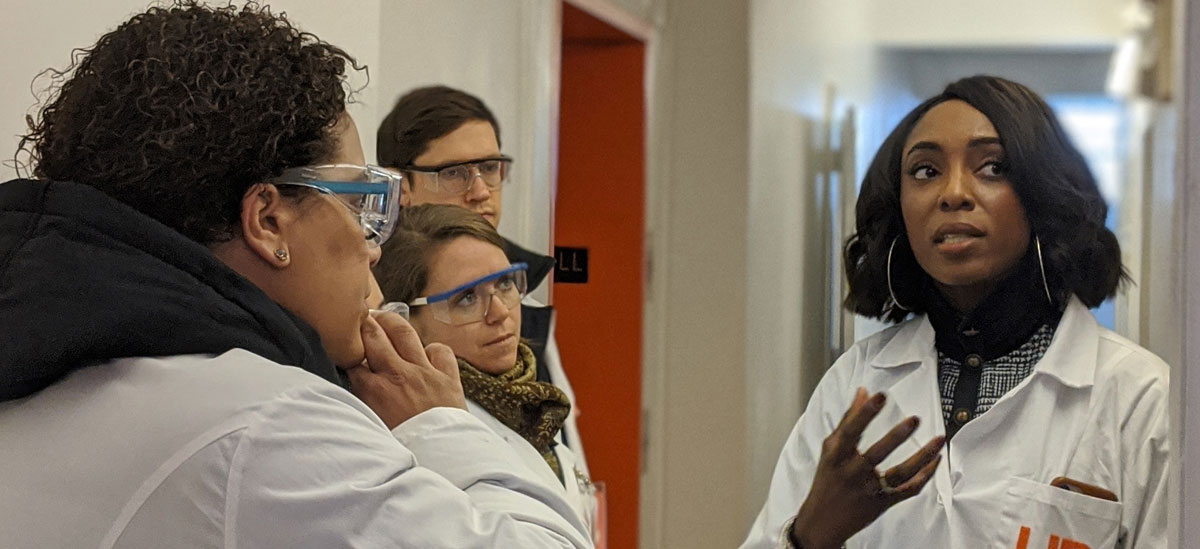
Jessica Matthews was a teenager when she realized the importance of power -- not just the “having authority” kind of power, but the “electrical generation” kind of power. Raised in Poughkeepsie, New York, with dual U.S. and Nigerian citizenship, Matthews grew up spending summers in Nigeria where electricity was unreliable.
“The irony is that all my cousins in Nigeria had a better cell phone than I did in the U.S., and yet, having more than a 10% charge on their phone was a struggle,” says Matthews, 33, founder and CEO of Uncharted Power. “In Nigeria, regardless of whether you live in the village or the bustling city, it is common to lose power several times a day, sometimes every day.”
When the power went out during her aunt’s wedding when Matthews was 17, the acrid odor from the diesel-fueled generator that allowed the event to go on marked the beginning of a turning point for her. Her cousins’ apathy frustrated her. “You’ll get used to it,” they said. “Despite being trained engineers, they just assumed that the best way to deal with the problem was to pretend like it didn't exist," says Matthews.
And then Matthews lost three Nigerian relatives prematurely--all from causes she believes could have been avoided if they had access to sustainable infrastructure. That’s when the light bulb turned on for her: the only time she saw her cousins excited is when they were playing soccer. So at 19, Matthews and her Harvard classmates invented the SOCCKET, a soccer ball that, after one hour of play, stored enough kinetic energy to power a reading light for three hours.
SOCCKET Snowballed
The idea of connecting the world’s most popular sport with one of the world’s most abundant assets -- the ground -- to create energy was genius in its simplicity.
In 2013, President Obama met with Matthews during his tour of a GE Africa power plant in Tanzania, where he kicked and headed the SOCCKET before plugging his phone into the ball to recharge it. "The SOCCKET turns one of the most popular games in Africa into a source of electricity and progress,” President Obama told CNN. “You can imagine this in villages all across the continent.”
While the SOCCKET ball inspired many, it didn’t motivate her Nigerian cousins to solve the infrastructure crisis. Once again, Matthews took the matter into her own very capable hands. The company that she and her Harvard classmate Julia Silverman started – Uncharted Play – became Uncharted Power and Matthews, who by then had two degrees from Harvard, 12 patents and a multimillion dollar business, began to turn around an infrastructure industry in which there was no one who looked like her.
The company’s mission – what Matthews says is “her true north” -- is to create a world where there's universal access to smart, sustainable infrastructure, a world in which the infrastructure wouldn’t abandon people like it had her own family.
Matthews moved the company to Harlem, NY, raised $7 million in Series A funding and, recognizing that the intelligence of the SOCCKET ball was really a distributed data center, began designing for smarter grid-connected cities.
Matthews describes Uncharted Power’s technology as the smartphone of infrastructure. Think of smart infrastructure solutions related to grid resilience, broadband connectivity, and mobility as apps that sit on a cloud-based platform, which optimally enables and regulates the connected pieces of infrastructure.
It’s an idea that’s catching on. Matthews’ hometown, Poughkeepsie, has begun a $1.8 million pilot project with Uncharted Power to become the world’s first true smart city.
“This pilot program will demonstrate how we can rebuild our local infrastructure to be resilient in the face of new challenges and accelerate growth for our local businesses and residents," said Rob Rolison, mayor of Poughkeepsie, when he announced the program during the pandemic in October 2020.
The Power of Inspiring Change
The transition from a company that focused on play to one that’s competing for significant government contracts was uncharted territory for Matthews. She overcame “imposter syndrome” to build the company and inject new energy – literally – into an outdated industry. That’s one reason Matthews shares her story with young people and other entrepreneurs, especially women.
“Everyone let me do my thing when they thought I was working on play,” says Matthews. “There are people who won’t want you to succeed. I’ve learned to not make it easy for them to marginalize me.”
Educating and inspiring others is the mission of the nonprofit Harlem Tech Fund that Matthews founded “to make sure that Uncharted Power wasn’t the only tech company in Harlem.” The organization utilizes Matthews’ SOCCKET and the related Pulse jump rope to teach kids about sustainability and leadership in a technology-driven world.
“When I think about how the smartphone has democratized the way we live our lives, it’s hard not to be incredibly excited about the future,” she says, “because the platform we’re developing has the power to change and sustain the environment we live in.”







